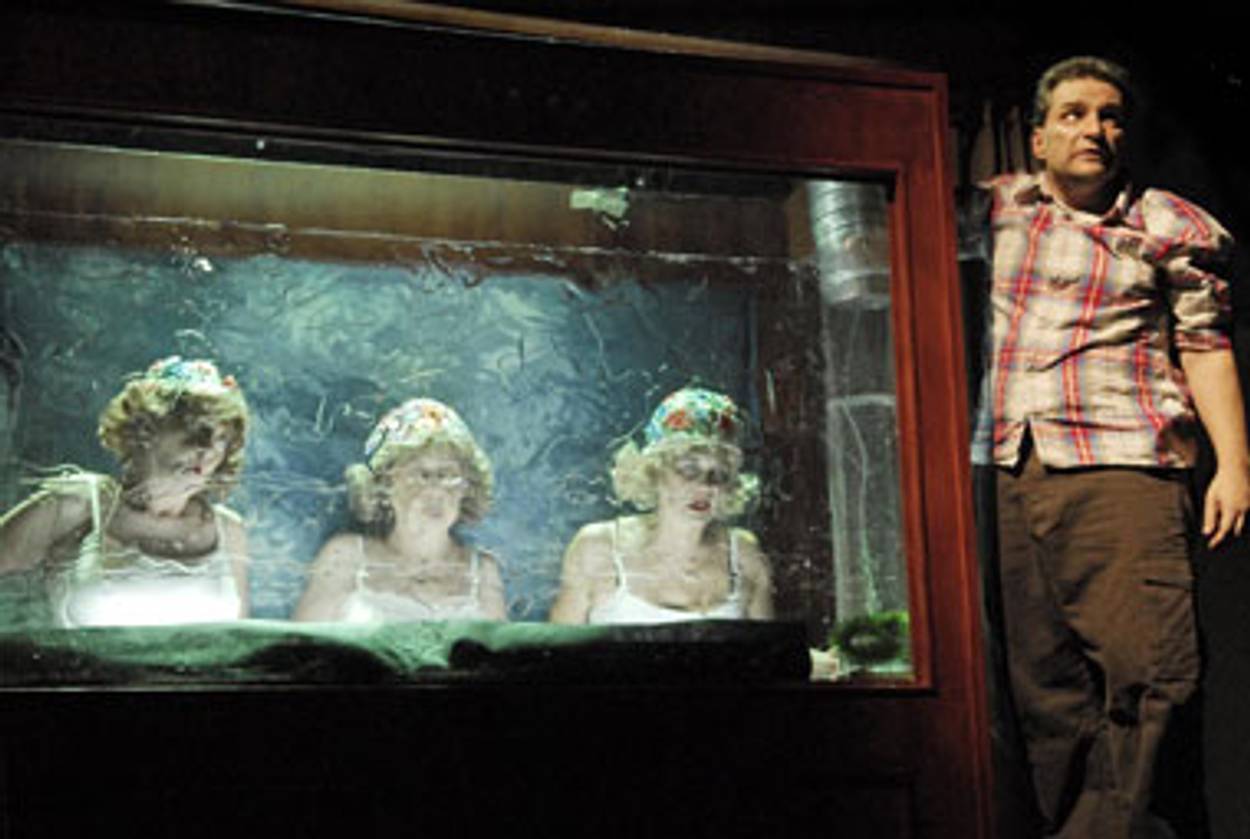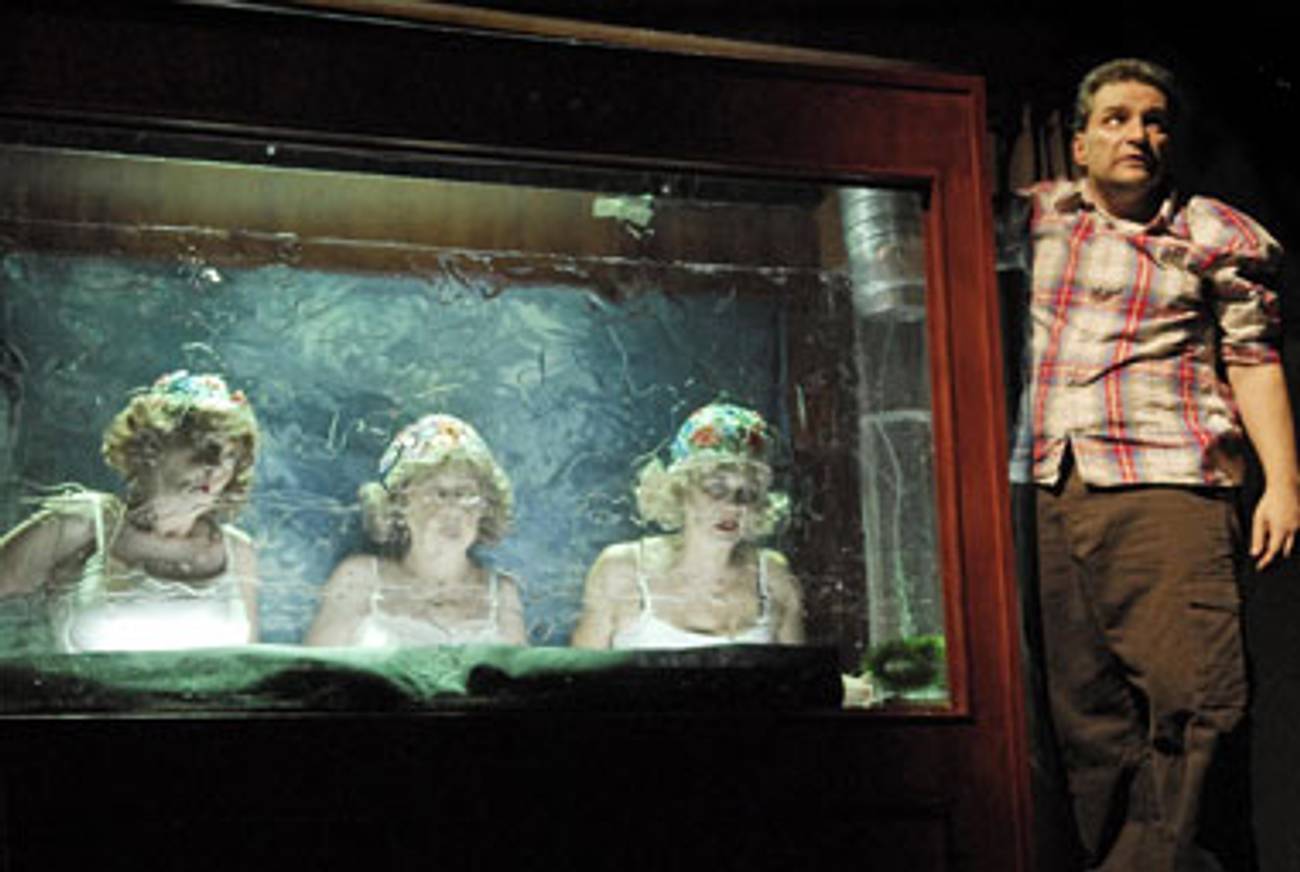Mommies Dearest
In Daniel Burman’s first play, a son tries to escape his mother’s grasp




From Meyn Yiddishe Mame (1930) to Portnoy’s Complaint (1969), Jewish mothers have so frequently been portrayed on the page and onscreen as larger-than-life characters—spewing out affection, anxiety, guilt, and criticism onto their children like fire hoses—that it is not a particular surprise to encounter one, in Daniel Burman’s debut play, Las Llaves de Abajo (The Keys for Downstairs), so huge that she must be represented, at once, by three actresses.
More unexpected is Burman’s writing and directing a theatrical piece. In recent years, the young Argentine has made an international name for himself with a series of charming semi-autobiographical films set among Buenos Aires’s Jewish population—including Waiting for the Messiah (2000), The Lost Embrace (2003), Family Law (2006), and Empty Nest (2008)—earning him a not-altogether-sensible reputation as the Argentine Woody Allen. His films have taken home awards from festivals in Berlin, Biarritz, Valladolid, and Havana, and aside from screenwriting and directing, his credits include co-producing the international hit The Motorcycle Diaries (2003).
So why would an auteur with a growing international following, lauded by The New York Times as “an outspoken champion of understatement,” turn to mounting a one-act play currently being staged in a cultural center in the heart of Abasto, a Buenos Aires neighborhood so thoroughly Jewish it boasts the world’s only kosher McDonald’s outside of Israel?
The stylistic difference between Burman’s films and the play explains at least part of this unanticipated move. Burman’s movies are remarkable for their gentle humor and sweetness, for the care with which they detail family relationships, and for the precision of their portraits of Buenos Aires’s counterparts to New York’s Lower East Side. On film, he represents emotions subtly, through a father and son’s quietly shared meal or an afternoon’s aimless walk.
In Las Llaves de Abajo, on the other hand, the son—played by Damián Dreizik, who co-wrote the play and appeared as comic relief in Family Law—reaches out to strangle his mother, in garish pantomime, to demonstrate his frustration. His mothers, dressed as skeletons, perform a black-lit striptease in which they pluck their bones off one by one and toss them aside. In an earlier scene, the mothers swim and gurgle in a fish tank while their son contemplates pulling the plug on them. Burman’s attention to “attractive visuality” on stage, as La Nación, Argentina’s only broadsheet, called it, owes to his cinematic eye, but tonally Las Llaves de Abajo evokes the Sunday funnies and Looney Tunes more than any of his modest, realist films.
Yet the play is by no means a complete departure for Burman, as it attends to exactly the sorts of generational loyalties and conflicts that propel his films. At 42, Gabriel wants to escape the overbearing grasp of his mother, Mabel, represented in her three incarnations as affectionate, depressive, and euphoric by Adriana Aizenberg, Chela Cardalda, and Elvira Onetto. He cannot physically exit their apartment, though, because the mothers have changed the lock. When Gabriel decides, even with the keys finally in his hands, to ignore his children and estranged wife waiting below and remain by his mothers’ side, his pronouncement of “You three are my Eden! My refuge!” broadcasts in no uncertain terms his inability to leave his childhood behind. In cartoonish fashion, then, the play confronts what Burman has called “a battle of titans between [Gabriel] and his mothers, or between his present and his past.”
Is Mabel meant to be a specifically Jewish mother, an Argentine Mrs. Portnoy? So it would seem, as the show’s producers, after some debate, settled on the surname of Cohen for Gabriel, instead of Ventura (a Sephardic name that might not be noticed as Jewish). But Burman himself isn’t certain. “No, they’re not a Jewish mother and son, or yes—I don’t know,” he told an interviewer. Although Burman says he makes “an enormous effort to avoid the theme of Jewishness in [his] works,” it’s clear that Gabriel and Mabel’s relationship would resonate with Jewish audiences from New York to Paris to Tel Aviv, if translated and stripped of some of the more obscure local references.
Which is why, as intriguing as it is to see a promising young artist extending his generic and tonal range, Burman’s American and European admirers must hope that theatrical experiments like Las Llaves de Abajo won’t detract from his filmmaking. DVDs are, of course, a whole lot easier to ship overseas.
Josh Lambert is a contributing editor to Tablet Magazine. Sara Kippur is an assistant professor of language and culture studies at Trinity College.
Josh Lambert (@joshnlambert), a Tablet Magazine contributing editor and comedy columnist, is the academic director of the Yiddish Book Center, Visiting Assistant Professor of English at the University of Massachusetts, Amherst, and author most recently ofUnclean Lips: Obscenity, Jews, and American Culture.
Sara Kippur is an assistant professor of language and culture studies at Trinity College.